"Sustaining Keyboards" Symposium

September 15-16, 2023
Cornell University
Ithaca, New York, USA
Schedule | Presenters and Performers
Whether splendid tools of the virtuosos in concert hall and cathedral, or symbols of intimacy and escape in the subterranean practice room or moonlit drawing room, keyboard instruments and their music do not exist in isolation. The very materials used in their construction— from the spruce soundboard in a Ruckers harpsichord, to the ivory key tops on an Érard piano, to the lead-tin alloy pipes of a Stellwagen organ —proclaim their connection to the wider world, to global networks of trade, innovation, and exploitation, with diverse ecological and infrastructural conditions. Transforming these raw materials into exquisite keyboards and the music they produce are the many unsung figures of music history: loggers, hunters, brokers, entrepreneurs, cabinetmakers, tuners, and conservators.
This symposium asks how notions of sustainability might prompt us to think anew about keyboard histories, embedded as they are in ecologies of nature and commerce, artifice and art, craft and industry. What are the stories keyboard instruments tell about climate and changing weather, extraction and global trade, nature and environment? From matter and materials, to institutions and infrastructure, what are the challenges for conservation, restoration, and curation of historical keyboard instruments? To what extent are those histories, and the instruments that embody them, sustainable into an uncertain future?
Over a day-and-a-half we will consider these questions in a series of panels, workshops and concerts, with performances on Cornell’s collection of historical pianos and organs.
This symposium is made possible by the Atkinson Forum at Cornell, with co-sponsorship from the Cornell Center for Historical Keyboards, the Cornell Department of Music, and the Westfield Center for Historical Keyboard Studies.
All events are free and open to the public unless noted otherwise. Refer to the complete schedule below.
Schedule
Friday, September 15
12:30-1:30pm | Opening Recital: The Organ's Nature | Sage Chapel
Annette Richards and David Yearsley explore natural histories in sound, conjuring forests, birds, and landscapes through the music of Byrd, Sweelinck, Monteverdi, Pärt, and Yearsley, at the Italian baroque (1746) and Aeolian-Skinner (1940) organs.
2:00-4:30pm | Panel 1: Sounding Globally, Playing Locally | A. D. White House, Guerlac Room
Janie Cole “Global Circulation of Renaissance Keyboards in Early Modern Sub-Saharan Africa”
Kirsten Paige “Micro-Climates, Micro-Fibers, and the Climate-Resistant Piano, ca. 1900”
Fanny Gribenski, “The Organ as Colonial Infrastructure”
David Yearsley, “Catastrophe and the Cornell Organs: Floods, Fires and the Future”
Andrew Hicks, moderator
View abstracts ↴
Global Circulation of Renaissance Keyboards in Early Modern Sub-Saharan Africa
Janie Cole (Yale University)
Keyboards often served as essential commodities in early modern European overseas exploration and expansion, circulating as a motivation of colonial, diplomatic, commercial, and religious interests. Yet while we know much about the circulation and use of keyboards in trading centers, missionary activities, ambassadorial ventures, and educational institutions in the New World and Asia, few studies have focused on their presence and cultural functions in Africa. Drawing on late Renaissance travelers’ narratives, missionary records and indigenous sources, this paper presents three case studies from the North-East African highlands, West-Central and Southern Africa, to explore the dissemination, musical functions, and cultural significance of the earliest documented Western keyboards in sub-Saharan Africa, and how keyboard performances served as a construct for representation, identity, agency, and power in Afro-European encounters and colonial perspectives.
First, it focuses on one of the earliest recorded encounters between the Christian kingdom of Ethiopia and Latin Europe in 1520, namely between a Portuguese embassy and the court of King Lebnä Dengel, to provide new details on keyboards used for diplomacy and gift-giving, the local faranji (foreigners) community of musicians, and the first recorded European instruments to be brought into Ethiopia. Second, musical encounters in South Africa in Cape colonial society during the 1650s between the retinue of Jan van Riebeeck and the local indigenous Khoekhoe community reveal the use of keyboards in colonization processes and a wider trade in keyboards in South Africa and its relation to the local environment, weather and climate. Finally, early references to missionary keyboards taken to the Kingdom of Kongo during the 1490s and possibly one of the earliest ethnographic visual representations of a European keyboard in Africa from the 1650s point to the possibility that harpsichords had reached West-Central Africa by the mid 17th century (if not earlier), being employed as identifiers of power, elite status and cultural appropriation. These Afro-Eurasian encounters offer tantalizing views on the spread of keyboard instruments across three continents, relations to local ecologies, materials and climates, and how they were used as colonial, evangelical, and political tools by European powers, thus giving broader insight into the role of Renaissance keyboards in constructing cultural identity and the collisions of political, social and cultural hierarchies in Africa in an entangled global early modern.
Micro-Climates, Micro-Fibers, and the Climate-Resistant Piano, ca. 1900
Kirsten Paige (North Carolina State University)
“Ours is an Empire on which the sun never sets. Our countrymen are scattered all over the world. A social problem somewhat difficult of solution is how best to obtain a piano suited to the climate of the Tropics, especially India and Japan.” And so, in 1902, the English piano firm, Chappell & Co., described a perennial problem for piano manufacturers and practitioners: creating instruments to withstand humidity and heat, cold and sea winds. But Chappell was not daunted. Tailored to every climate on earth, their instruments were “impervious to insects” (reiterated several times), could survive “any change of climate or temperature,” and “war against heavy and persistent rainy seasons, sudden change of heat and cold.”
Chappell was proud of this achievement. But it wasn’t the only piano manufacturer that made such a claim. It was a subject of conversation at the 1893 World’s Fair in Chicago and 1910 United Provinces Exhibition in Allahabad, India, where piano firms met to exhibit and assess pianos suitable for extreme climates. As J. Q. Davies has noted, Albert Schweitzer commissioned a climate-resilient piano from Gaveau of Paris for his trek through Gabon in 1913. Language of imperialism often surrounded this trend in other contexts, too: New York piano firm Wing & Son stated in 1902 of its climate-resistant pianos that, “as is said of the British Empire, it can be truly said also that the ‘sun never sets on the Wing Piano.’”
In this paper, I’m interested in asking how rhetoric and practices of imperialism and colonialism were brought to bear upon the climate-resilient piano market around 1900. In particular, I’ll focus on German and British climate-resistant pianos, including those that were produced for and tested at the United Provinces Exhibition in Allahabad. I’ll consider how climate-oriented piano design, often described in meticulous detail and touted as backed by scientific methods, participated in seemingly universal scientific classification schemes that enshrined colonial power.
The Organ as Colonial Infrastructure
Fanny Gribenski (New York University)
Recent studies have analyzed the role of recording and large-scale communication networks in the production of global soundscapes. Prior to the emergence of these media, however, the worldwide circulation of musical instruments had long enabled exchanges of musical sounds, across the globe. This paper introduces the organ as colonial infrastructure, showing the value of infrastructural approaches to the instrument for ongoing conversations about sound and power on a global scale, and the reciprocal potential of infrastructure studies to renew our understanding of the instrument’s “social life” (Bates 2012). Centering my analysis on France’s efforts to develop and maintain a network of organs in the country’s nineteenth-century colonies, I first examine how the construction of these large pieces of equipment relied on cooperation between broad and diverse segments of society—a perspective that offers a good starting point to disentangle the entwined histories of religion, politics, and technology in colonial settings. I then consider the dual role of the organ as a disciplining tool within broader programs of economic exploitation and as a “contact zone” (Pratt 2008) that ultimately enabled the hybridization of liturgical and musical practice. Finally, I turn to recent work in the field of technology studies that has emphasized the necessity of moving away from questions of design and innovation to instead examine problems associated with the repair and maintenance of technology. I show that French authorities continuously failed to sustain an operational network of organs in the colonies, due to the impact of climatic conditions on the instrument. Yet despite these material failures, attempts to create a powerful infrastructure produced important and long-lasting social and environmental effects, triggering ever-more intensive extractive practices.
Catastrophe and the Cornell Organs: Floods, Fires and the Future
David Yearsley (Cornell University)
Organs are the biggest, most expensive, most ornate, most mechanically complex of musical instruments and so present unique challenges in their preservation. Protecting and maintaining them, whether in churches or stately homes, masonic lodges or sporting arenas, requires contending with forces small (termites, mice, the “tin-pest”) and large (wars, revolutions, environmental collapse); visible (lightning) and invisible (extremes of humidity and skin-cracking cold). Disassembling (and therefore silencing) an organ and removing it to a climate-controlled storage unit or, in the case of a looming airstrike, a supposedly bomb-proof bunker is the protracted work of an army of experts. Yet many organs made centuries ago are still sounding. Others have fallen victim to one catastrophe or another, or many at once.
Turning from the global to the local, we focus in this talk on Ithaca, NY and the organs of Cornell. An organ that was the pride of founding Cornell President Andrew Dickson White was ruined by flood and has long since disappeared from Bailey Hall; the Aeolian-Skinner organ built in Sage Chapel in 1940, vulnerable to cracking walls and intruding bats, is a palimpsest of previous instruments rendered obsolete by changing fashion or expanding student numbers; a remarkable survivor from mid-18th-century Naples also housed in Sage embodies resilience to climate and woodworm; in Anabel Taylor Chapel the Cornell Baroque Organ stands in the place of two earlier instruments, the first gifted in memory of a son killed in battle, the second made place for by an act of arson, the present instrument finding its curious origins in the forests of Germany, the castles of Berlin, and a department store in Tokyo. These instruments speak of place, time, material, history—and the people who commission, create, and use them.
How might we explain the threats, old and new, to the organs on this campus: structural, climatic, aesthetic, institutional, practical? What is the relationship between these millennium-old musical technologies, the systems designed to preserve them, and the people who operate them? What are the possible fates that await this unique and costly collection in the decades—never mind centuries—ahead? Can—or should—these sounding artefacts and investments be sustained into an uncertain future?
5:15-7:15pm | Opening Reception & Keyboard Salon with Malcolm Bilson | Hans Bethe House, Apartment of House Professor - Dean Andrew Hicks
Reception served with heavy hors d'oeuvres, preceded by a musical amuse-bouche, “Bach and Silbermann,” presented by Malcolm Bilson.
For participants and members of Bethe House
7:30pm | Recital: Wood and Wire, Song and Dance | Barnes Hall, Auditorium
Matthew Bengtson performs works by Mozart, Chopin, Fauré, and others on a selection of instruments from the CCHK piano collection.
Saturday, September 16
9:00-11:00am | Panel 2: Antiques in Action | A. D. White House, Guerlac Room
Kenneth Slowik “Re-restoration of a 1770 Kirkman Harpsichord.”
Bruce Shull “Reconstruction of the 1819 Bachmann organ”
Ken Walkup “Restoration of the 1843 Pleyel piano”
Anne Acker “It’s a Material World”
Annette Richards, moderator
11:00am-12:00pm | Roundtable Discussion: Sustaining Keyboard Instruments | A. D. White House, Guerlac Room
Discussion of talks from Panel 2 and beyond. Participants include the panelists, joined by scholars and performers.
Lunch will be served after the roundtable
1:00-2:00pm | Recital: The Forest and The Trees | Barnes Hall, Auditorium
Pianists Malcolm Bilson, Xak Bjerken, Sezi Seskir, Brian Wang, and Miri Yampolsky present a program featuring piano works inspired by nature, using a selection of instruments from the CCHK piano collection.
2:30-4:30pm | Panel 3: Material Stories from The Past and For The Future | A. D. White House, Guerlac Room
Morton Wan “Silver, Timber, and Labor: Three Short Stories around the First Piano Company in China”
Alexander Meszler “Nature or Novelty: The Use of Bamboo as a Pipemaking Material in the Asia Pacific”
Randall Harlow “To Compose or Compost? Cultivating Historic Keyboards in the Chthulucene”
David Yearsley, moderator
Discussion of all papers together at end of session (4-4:30pm)
View abstracts ↴
Silver, Timber, and Labor: Three Short Stories around the First Piano Company in China
Morton Wan (Cornell University)
In 1897, twenty-some years after establishing its presence in Shanghai and three years subsequent to shifting its manufacturing base from England to the Chinese treaty port, S. Moutrie and Co., an English piano builder and retailer, turned out the very first commercially produced keyboard instrument in China. Rapidly attaining renown for their exquisite tone, reliable craftsmanship, and unrivaled affordability, Moutrie’s pianos captured international attention for the company’s stature as the sole piano manufacturer in the Far East and its bold business experiment: importing materials and components globally while manufacturing the instruments locally using Chinese laborers.
This paper provides a historical-economic analysis of Moutrie’s “source global, build local” model through three cross-cutting accounts of these earliest “made in China” pianos’ embeddedness in colonial-industrial capital networks, as the global flows of bullion and commodities converged at the Chinese treaty port and interfaced with local cultural and social conditions. First, I connect Moutrie’s decision to relocate its piano production to the arbitrage opportunity arising from the fin-de-siècle global silver devaluation, as Europe and the US moved away from bimetallism, making the Chinese entrepôt, with its silver-based legacy currency standard, a low-cost manufacturing destination. I then contextualize contemporaneous reports on Moutrie’s diverse timber sources for its piano construction, ranging from Thai teak and Japanese beech to Canadian spruce, with historical data on lumber farming from the period, thereby sketching out the ecological ramifications resonating further up the piano company’s supply chain. Lastly, I turn my attention to the nearly two hundred Chinese laborers recruited by Moutrie. While Moutrie trained these local artisans by adapting their expertise in Chinese traditional wood and lacquer work for piano assembly, the company also rigorously maintained segregation between its English and Chinese employees, in order to guard the specialized skills pertaining to its piano design’s more critical and proprietary aspects—tuning, voicing, and action installation—from the Chinese workers.
In tying these three threads together—the financial, the ecological, and the social—I finish the paper by prompting us to consider how Moutrie’s pianos might be said to mark the keyboard instrument’s newly acquired glocal identity within a materialist framework of early twentieth-century treaty port commerce while simultaneously registering the various aspirations and perils of Shanghai’s semi-colonial capitalism.
Nature or Novelty: The Use of Bamboo as a Pipemaking Material in the Asia Pacific
Alexander Meszler (Luther College)
Bamboo, one of the most plentiful and fast-growing resources in the Asia-Pacific, has on several occasions been used as a pipe organ building material. While hardly a common occurrence, their existence throughout the centuries (19th, 20th, and 21st) and throughout the region (at least China, Japan, Korea, and the Philippines) makes the use of this material more than a simple divergence from “traditional” European norms. The earliest “bamboo organs” were built by missionaries, and while most story details are lost, it is still possible to theorize about the creative use of this “new” (to Europeans) material. Were builders engaging in a form of cross-cultural religious or political diplomacy by using locally familiar materials when introducing their impressive musical technology? Were they just using what was available to them? How are these questions and their possible answers recontextualized when viewing the extant historical and modern examples of these organs today? By engaging with the few limited studies of these instruments and a considerably more developed study of bamboo as both musical and general construction material, this paper broadly analyzes bamboo’s environmental and cross-cultural role in pipe organ building throughout the history of the organ in Asia.
To Compose or Compost? Cultivating Keyboards in the Chthulucene
Randall Harlow (University of Northern Iowa)
Perhaps no family of instruments more fully embodies the troubled history of class, confinement, capital and colonial devastation interwoven throughout the history of common practice European music and beyond, than that of plucked, struck and wind-blown, fixed-pitch, keyboard-activated instruments. Keyboards for the Capitalocene! As we, artists, scholars, pedagogues and generally historically-informed humans, seek new ways to decolonize music institutions and discourse, to reassemble a more just and ubiquitous musicking, keyboard instruments present an acute challenge. Moving beyond a museum-piece frame, what role can such instruments, along with their associated repertoires and practices, play in an urgent music of now? How can we transcend the laudable, yet staid ambition of composing new-music-for-old-keyboards, which only perpetuates the old auteur-oeuvre framework, in order to sustain keyboard instruments and practices further into heterogeneous musicking of tomorrow? Taking the recent European “hyperorgan” movement as a place of departure, and weaving together notions of the analog, terrestrial and molecular from Claudia Molitor, Donna Haraway and Nicolas Bourriaud, among others, I aim to propose an alternative practice: composting (after Haraway) historical keyboards’ rich and often fraught networking of the material, aesthetic, socio-political into fecund ground for cultivating sustainable and symbiotic musickal kinships for artistic figuring in the Chthulucene.
5:30pm | Recital: Instruments and Adaptations | Anabel Taylor Chapel and Sage Chapel
Nathan Laube draws inspiration from the distinct voices of three different organs, in a program that includes J. S. Bach’s adaptation for the organ of Vivaldi’s Violin Concerto in D Minor, and Laube’s own remarkable transcription of Liszt’s Piano Sonata in B Minor. Cornell Baroque Organ (1706/2012), Italian organ (1746), Aeolian-Skinner organ (1940).
7:15pm | Conference Dinner | A. D. White House
For invited participants
Biographies
Annette Richards
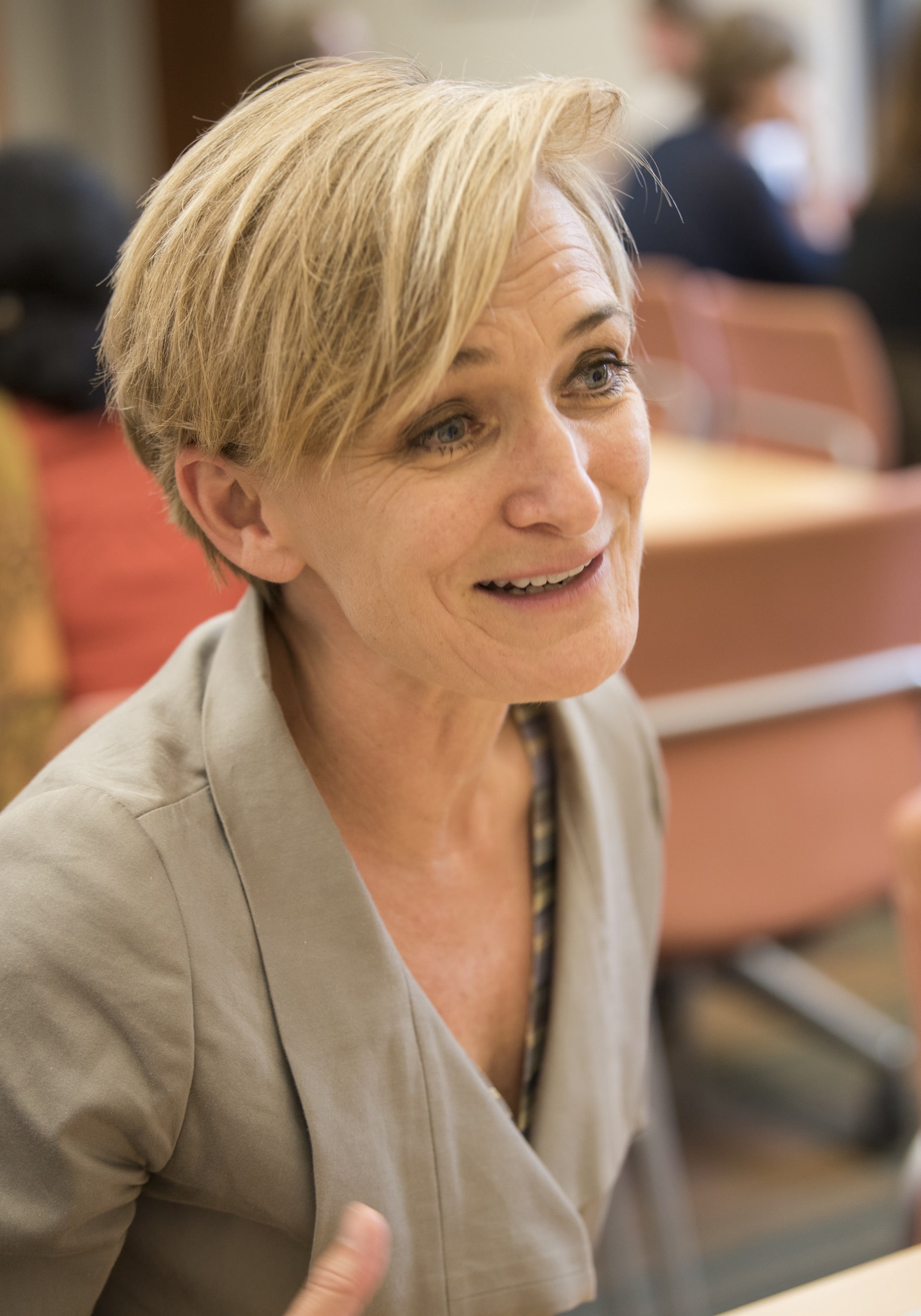
Annette Richards is an organist, writer, and teacher specializing in historical keyboard instruments and music of the 17th-19th centuries, but ranging far beyond in her research and playing. Recent performances include explorations of Neapolitan music around 1600, American organ culture c. 1940, and the music of 19th-century English lady organists. Her main writing project at the moment is a book on music and the history of touch, but she is also working on an essay on the Hammond organ, Bach, and the mid-20th-century American family. Annette’s recordings include the complete works of Melchior Schildt (on the Loft label) played on the historic organ at Roskilde Cathedral, Denmark, and a recording of music from the library of Princess Anna Amalia of Prussia, recorded on the new German baroque-style organ at Cornell. Her most recent book The Temple of Fame and Friendship: Portraits, Music and History in the C. P. E. Bach Circle, which grew out of her work reconstructing the extraordinary portrait collection of C. P. E. Bach, came out in 2022 from University of Chicago Press. She has long collaborated with David Yearsley, with whom she won first prize at the Bruges Early Music Festival in the competition for organ duo, and with whom she has edited the organ music of C. P. E. Bach for the C. P. E. Bach: Complete Works edition. Other prizes and awards include third prize at the Dublin International Organ Competition, a New Directions Fellowship from the Mellon Foundation, fellowships at the Getty Center, the Stanford Humanities Center, and from the Humboldt Foundation in Berlin. Annette is the founding director of the Cornell Center for Historical Keyboards, and directed the Westfield Center from 2009-2019. She is the Given Foundation Professor in the Humanities and University Organist at Cornell.
David Yearsley
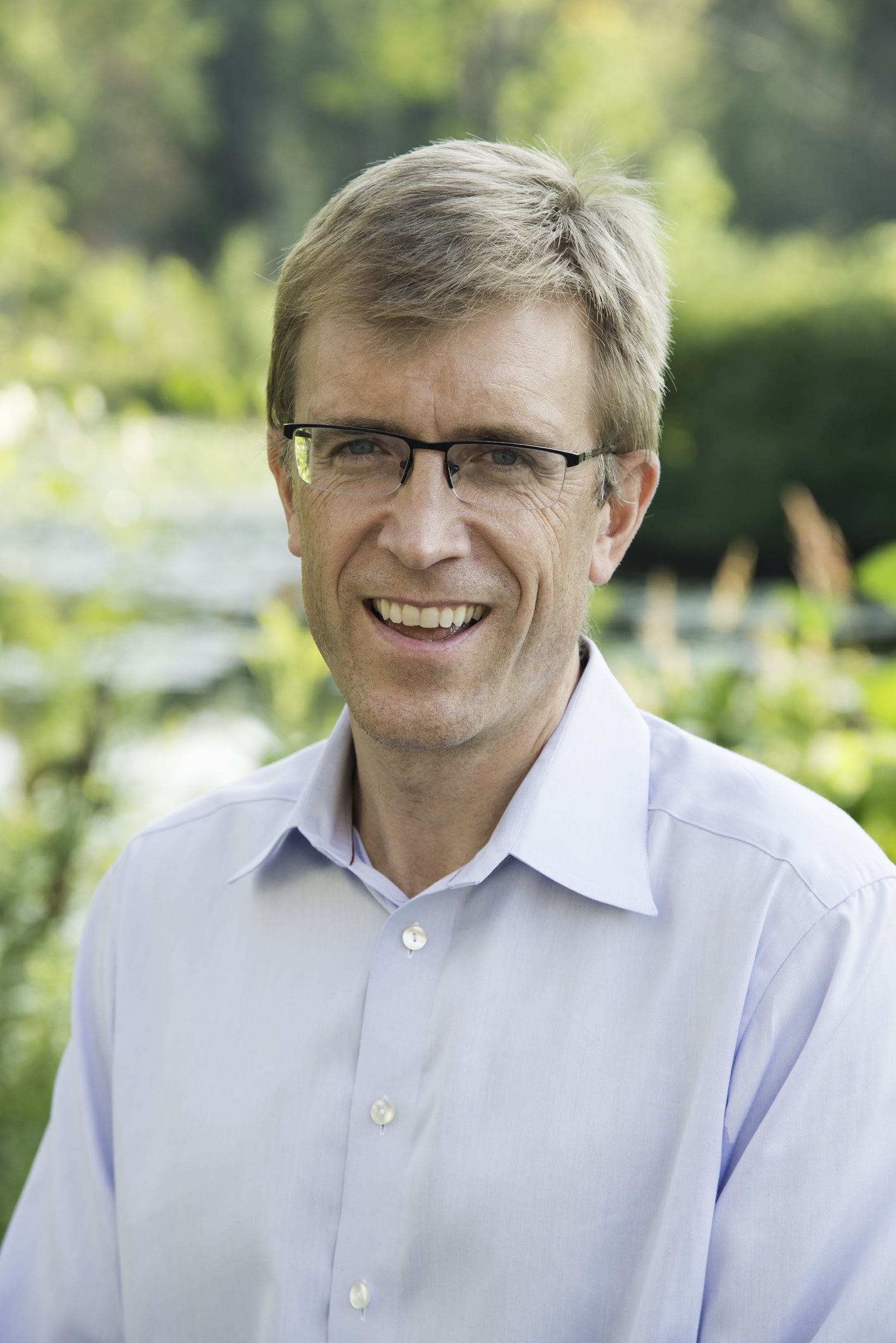
David Yearsley was educated at Harvard College and Stanford University, where he received his Ph.D. in music history. He is author of the widely praised Bach and the Meanings of Counterpoint (Cambridge University Press, 2002), Bach’s Feet (Cambridge, 2012), and Sex, Death and Minuets: Anna Magdalena Bach and Her Musical Notebooks (University of Chicago Press, 2019). Among his many honors as an organist are all major prizes at the Bruges Early Music Festival. He has been an Alexander von Humboldt Foundation Fellow at the Humboldt University in Berlin, a Wenner-Gren Foundation Fellow at the University of Gothenburg, and recipient of fellowships from the American Council of Learned Societies and the John Simon Guggenheim Foundation. His many recordings include J. S. Bach’s organ trio sonatas and Bach & Sons, both on the Musica Omnia label. He has been music critic for the Anderson Valley Advertiser for three decades; his weekly column can also be read at counterpunch.org. A long-time member of the pioneering synthesizer trio Mother Mallard’s Portable Masterpiece Company, he teaches at Cornell University, where he is the Herbert Gussman Professor of Music.
Janie Cole
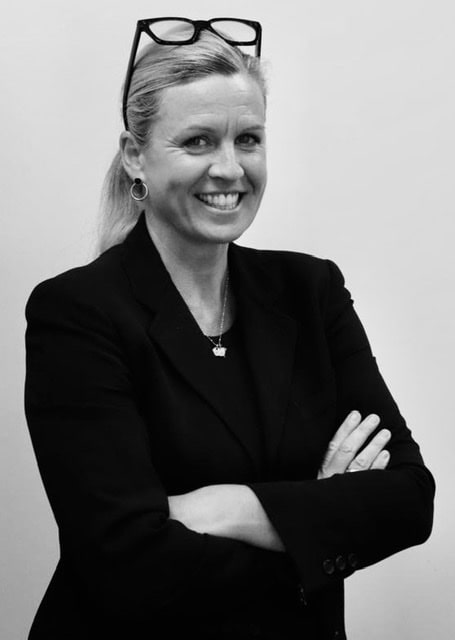
Janie Cole (PhD University of London) is a Research Scholar at Yale University’s Institute of Sacred Music and Visiting Professor in Yale’s Department of Music, Research Officer for East Africa on the University of the Witwatersrand and University of Cape Town’s interdisciplinary project Re-Centring AfroAsia (2018-), and a Research Associate at Stanford University’s Center for Computer Research in Music and Acoustics (2022-). Prior to this, she was a Senior Lecturer (adjunct) at the University of Cape Town’s South African College of Music (2015-23). Her research focuses on musical practices, instruments and thought in early modern African kingdoms and Afro-Eurasian encounters, transcultural circulation and entanglements in the age of exploration; the intersection of music, consumption and production, politics, patronage and gender in late Renaissance and early Baroque Italy and France; and music and the anti-apartheid struggle in 20th-century South Africa and musical constructions of Blackness, apartheid struggle movement politics, violence, resistance, trauma, and social change. Her current work centers on early modern musical culture at the royal court in the Christian kingdom of Ethiopia and intertwined sonic histories of entanglement with the Latin Mediterranean and the Indian Ocean world. She is the author of two books, as well as numerous articles in peer-reviewed journals and book chapters. Fellowships include The Harvard University Center for Italian Renaissance Studies and the Claude V. Palisca Award in Musicology from the Renaissance Society of America. She is currently the founding Discipline Representative in Africana Studies (2018-23) at the Renaissance Society of America, on the Editorial Advisory Board of Renaissance Quarterly, co-founder of the International Musicological Society Study Group Early African Sound Worlds and the founder/executive director of Music Beyond Borders.
Kirsten Paige
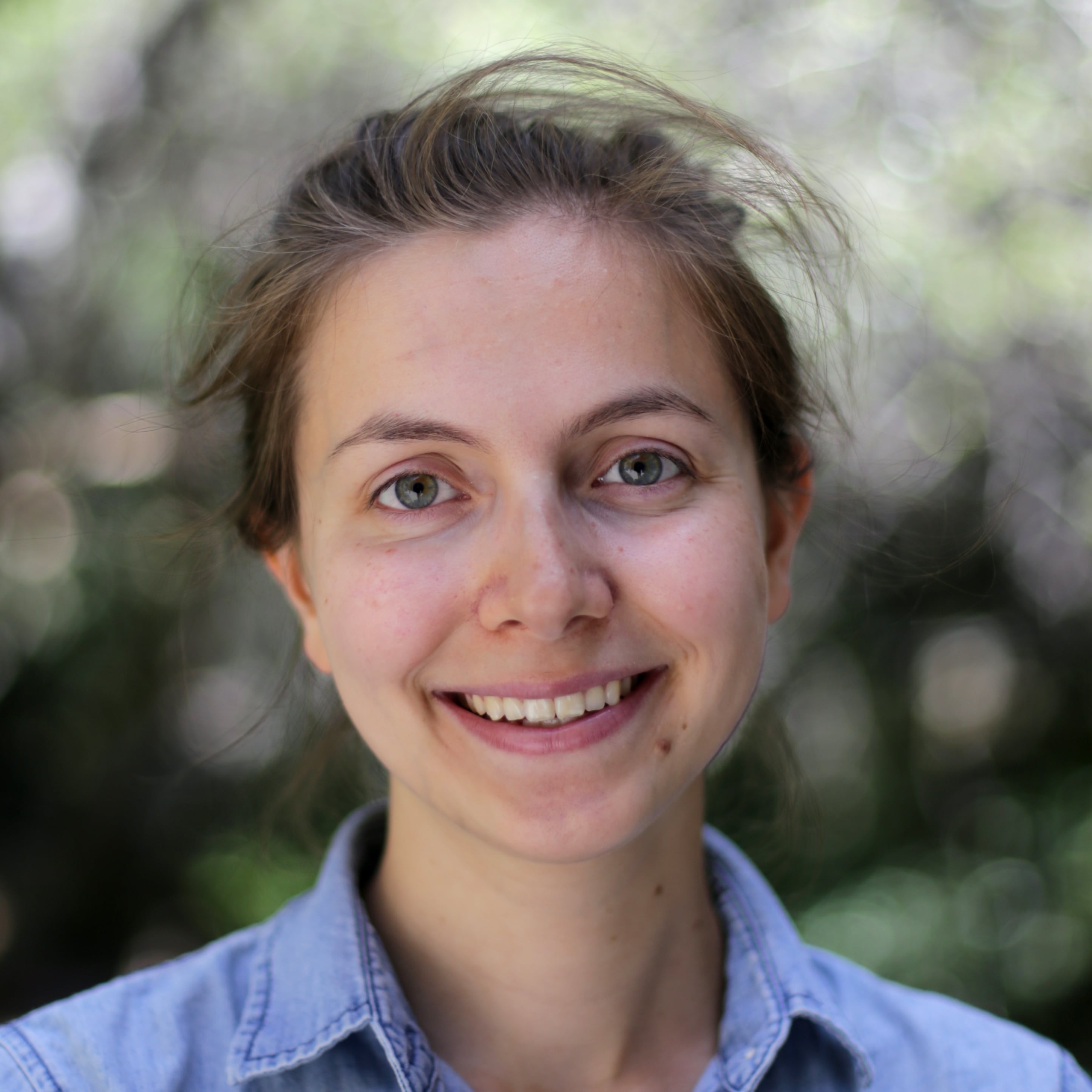
Kirsten Paige is an Assistant Teaching Professor of Musicology at North Carolina State University, where she is affiliated with the Music Department and with NC State’s Coastal Resilience and Sustainability Initiative. Before joining the NC State faculty, Kirsten was a Postdoctoral Fellow in Music at Stanford University. She received her Ph.D. in Music History and Literature from the University of California, Berkeley in 2018. Kirsten’s work asks how forms of scientific knowledge shaped musical practices and aural cultures in the long nineteenth century, with a particular focus on global scientific and cultural exchanges. Her essays have appeared in journals including 19th-Century Music, Opera Quarterly, Sound Studies, and the Journal of the Royal Musical Association. Her book, Richard Wagner’s Political Ecology, is under contract with University of Chicago Press.
Fanny Gribenski
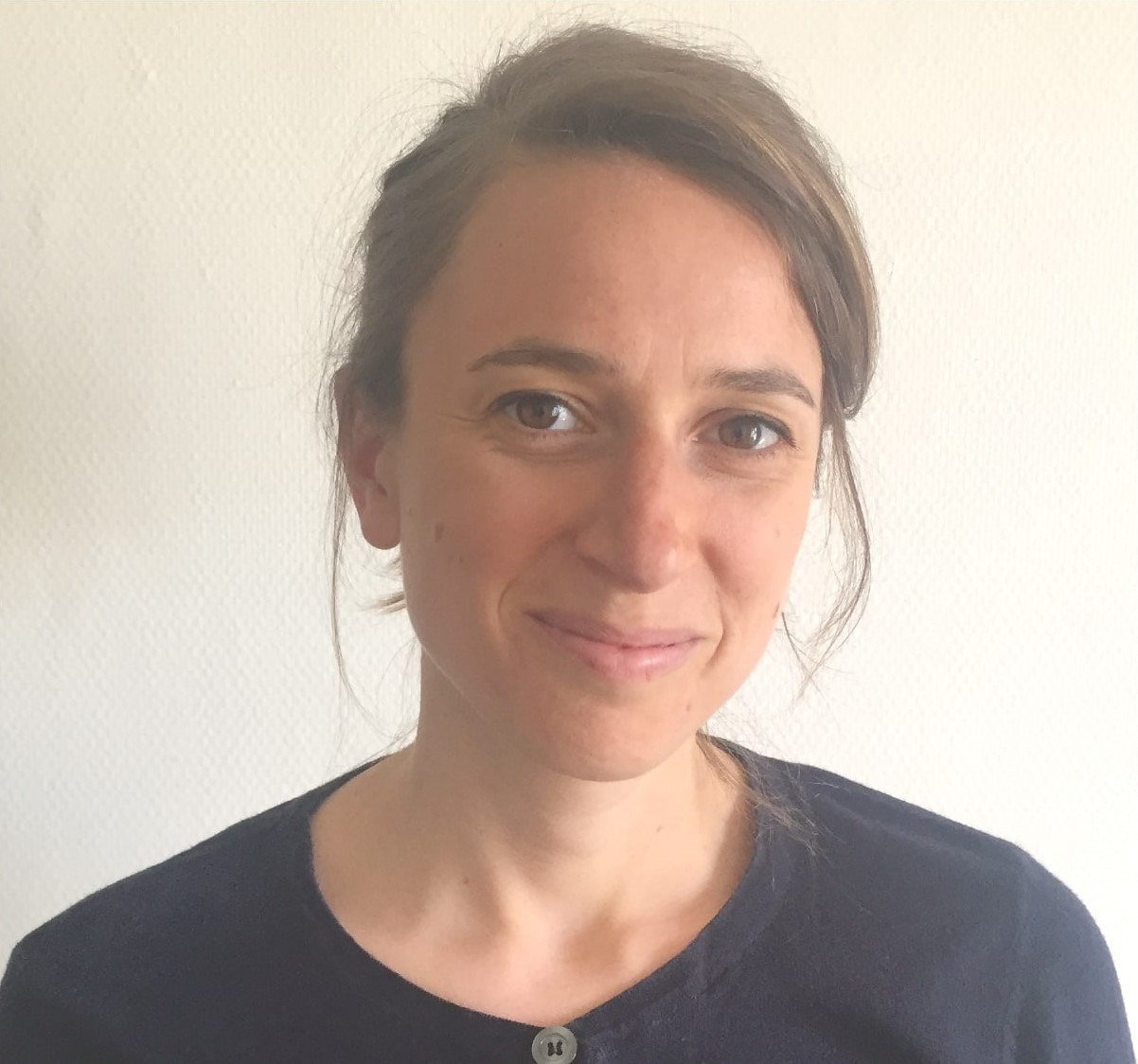
Fanny Gribenski is an assistant professor of music at New York University. She is the author of L’Église comme lieu de concert. Pratiques musicales et usages de l’espace (2019) and Tuning the World: The Rise of 440 Hertz in Music, Science and Politics (2023). She is the co-editor of Musiques et pratiques religieuses en France au xixe siècle (2022), of special issues of Contemporary Music Review (“Opening the Doors of the Studio,” 2020) and Transposition: Music and Social Sciences (“The Price of Music,” 2018), and of the memoirs of fin-de-siècle music lover Hermione Quinet (Ce que dit la musique [1893], 2016). Recent articles have appeared or are forthcoming in Past and Present, ISIS, Nineteenth-Century Music, Sound Studies, History of the Humanities, Revue d’Anthropologie des Connaissances, and the Revue de musicologie. With Viktoria Tkaczyk and David Pantalony, she is co-editing a book titled Unsound Supplies: Extractivism and the Material Provenance of Auditory Technologies. She has been a Fellow of the Thiers Foundation, the Fulbright Commission, and the Huntington Library, and worked as a Research Scholar at the Max Planck Institute for the History of Science (Berlin) and at the French National Center for Scientific Research and IRCAM (Paris).
Malcolm Bilson
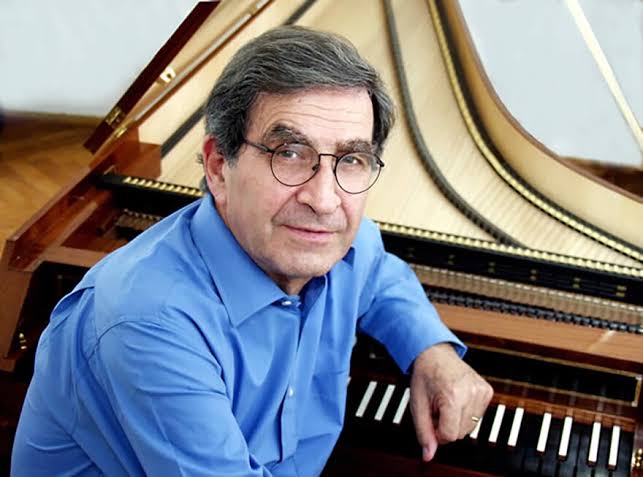
Malcolm Bilson has been in the forefront of the period instrument movement for more than thirty years. A member of the Cornell University Music Department since 1968, where he is the Frederick J. Whiton Professor of Music Emeritus, he began his pioneering activity in the early 1970s as a performer of Haydn, Mozart, Beethoven, and Schubert on late 18th- and early 19th-century pianos. He has been a key contributor to the restoration of the fortepiano to the concert stage and to fresh recordings of the mainstream repertory. In addition to an extensive career as a soloist and chamber player, Mr. Bilson has toured with the English Baroque Soloists with John Eliot Gardiner, the Academy of Ancient Music with Christopher Hogwood, the Philharmonia Baroque under Nicholas McGegan, Tafelmusik of Toronto, Concerto Köln, and other early and modern instrument orchestras around the world. He was awarded an honorary doctorate by Bard College, is a fellow of the American Academy of Arts and Sciences, and is a recipient of the James Smithson Bicentennial Medal at the Smithsonian Institution in Washington, DC, for his extraordinary lifetime achievements as “a pioneer in the performance of period instruments and chamber music in general.” In 2015 he was awarded the Order of the Hungarian Gold Cross by the president of Hungary for his “significant international artistic and scholarly career, and in recognition of his decades-long contributions to Hungarian musical life.”
Matthew Bengtson
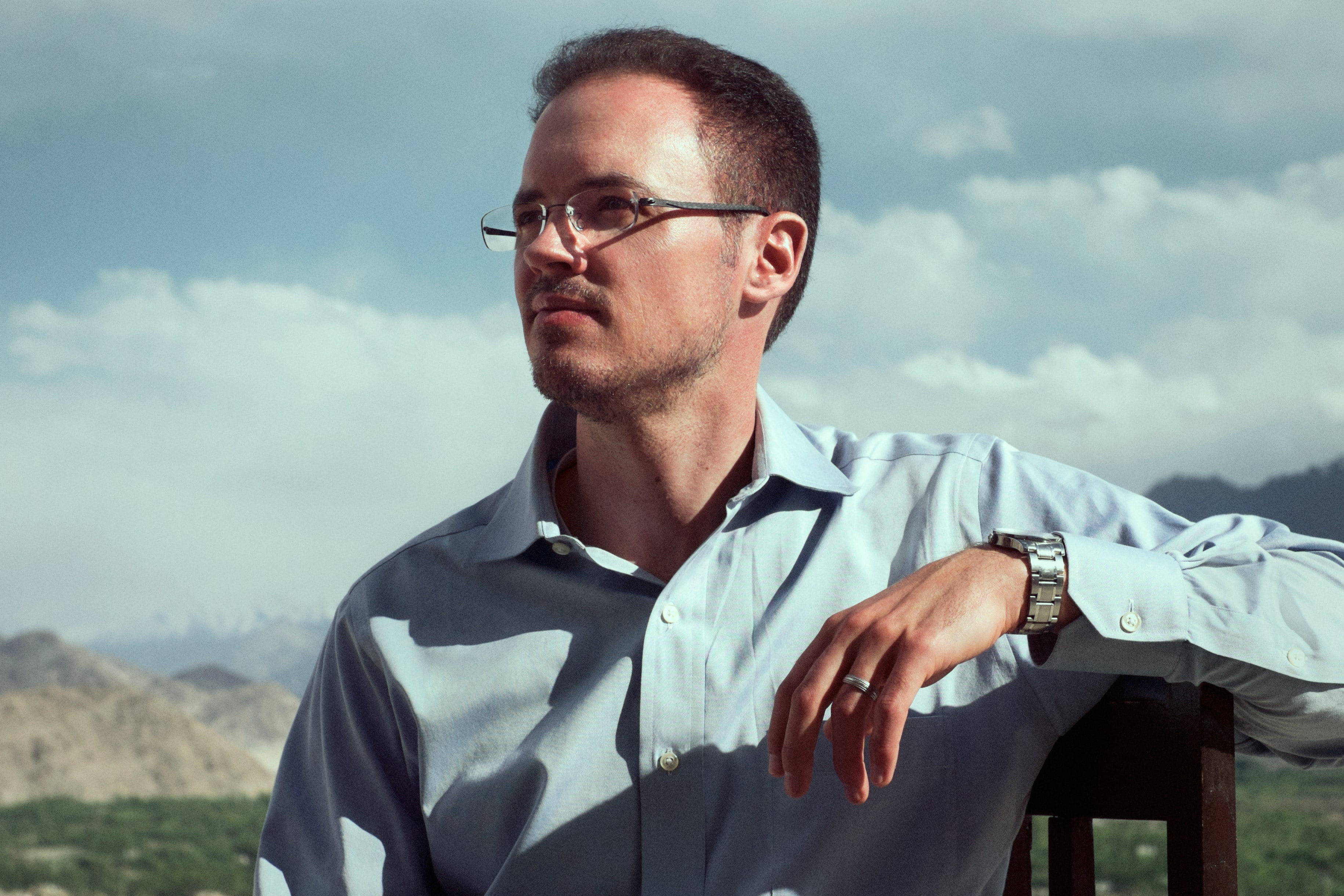
Critically acclaimed as a “musician’s pianist,” Matthew Bengtson offers a diverse repertoire, ranging from William Byrd to numerous contemporary composers with whom he actively collaborates. He has performed concerts as both soloist and collaborator in France, Germany, Italy, Poland, and Hungary, in Mexico, in Washington, DC, at Monticello, and in solo recitals at Carnegie Hall’s Weill Recital Hall. He has been heard with violinist Joshua Bell on NPR’s “Performance Today” and XM Satellite Radio’s “Classical Confidential.” His recordings can be heard on the Albany, Arabesque, Griffin Renaissance, IBS Classical, Navona, Musica Omnia, and Roméo record labels. Mr. Bengtson is lauded as one of the most persuasive advocates of the music of Scriabin and Szymanowski. On his complete Scriabin Piano Sonatas, the American Record Guide writes: “Big-boned pianism, rich tonal colors, and dazzling technique are on display here. Has Scriabin ever been played better? Only Horowitz and Richter can compare.” In 2015, he toured with the complete Scriabin sonatas, and performed in the historic centennial “Scriabin in the Himalayas” festival in Ladakh, India. Equally devoted to the music of Karol Szymanowski, he has recorded a 3-CD recording of the solo piano and violin/piano duo music of the great Polish composer, together with violinist Blanka Bednarz, on the Musica Omnia label, again to critical acclaim. The duo has presented numerous all-Szymanowski duo/solo recitals across the United States, and in Poland, including the Karol Szymanowski Museum in Zakopane. Mr. Bengtson has given numerous premieres, including the 12 Estudios rítmicos y sonoros by Roberto Sierra, recorded in Auditorio Manuel de Falla in Granada, Spain. That recording won the “Melomano de Oro” award, coveted for recordings in Spain. Mr. Bengtson is among today’s proponents of historical performance practice, preferring to perform music when possible on instruments from the era of the composer. He has given presentations and performances at the Historical Keyboard Society of North America and the Westfield Center for Historical Keyboard Studies, among others. Renowned as a writer and music educator, Mr. Bengtson is author of the Massive Open Online Course (MOOC) entitled “Exploring Piano Literature: the Piano Sonata,” available on Coursera, and is co-author of “The Alexander Scriabin Companion: History, Performance, and Lore,” available from Rowman and Littlefield Press. He is Associate Professor of Piano Literature at the University of Michigan School of Music, Theatre and Dance.
Kenneth Slowik
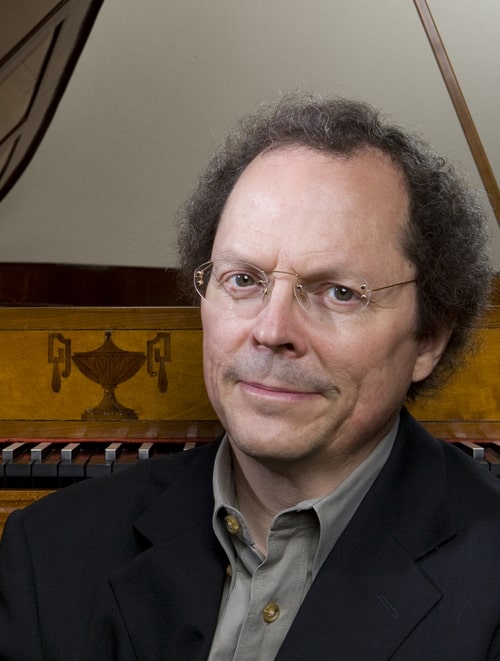
Kenneth Slowik is artistic director of the Smithsonian Chamber Music Society and a curator of musical instruments at the National Museum of American History. He is a founding member of the Smithsonian Chamber Players, the Axelrod and Smithson quartets, the Smithsonian Chamber Orchestra, and the Castle Trio, appeared frequently in performance and recordings with L’Archibudelli, and has been a soloist and/or conductor with numerous orchestras, among them the National Symphony, the Baltimore Symphony, l’Orchestre Symphonique de Québec, the Filharmonia Sudecka, the KwaZulu Natal Philharmonic, the Vancouver Symphony, and the Cleveland Orchestra. His extensive discography, spanning composers from Monteverdi to Richard Strauss, includes more than seventy recordings -- many of them international prize winners -- featuring him as cellist, violist da gamba, keyboard player, baryton player, and conductor. A member of the University of Maryland and the American Bach Soloists Academy faculties, Slowik was named Artistic Director of the Oberlin Baroque Performance Institute in 1993, and received the Smithsonian Secretary’s Distinguished Research Lecture Award in 2011.
Bruce Shull
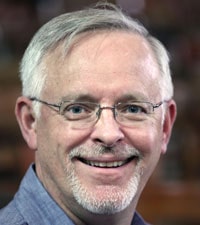
Bruce Shull, a native of Lancaster, Ohio, apprenticed as an organbuilder with John Brombaugh in Middletown, Ohio beginning in 1973. He graduated Oberlin Conservatory of Music where he studied organ with William Porter. He operated his own business in Charleston, West Virginia where he designed and built several organs, harpsichords, clavichords, and regals. He joined Taylor and Boody Organbuilders in Virginia in 1981 where his major work was in voicing of both flue and reed pipes. He carried out the research and documentation of the largest surviving organ built by David Tannenberg in 1800 and led the shop team during its restoration. He has published articles in The Organ Yearbook, Het Orgel and the ISO Journal and authored essays in Organ Restoration Reconsidered and Splendid Service. He also contributed an essay for Orphei Organi Antiqui—Essays in Honor of Harald Vogel. He has been a presenter at various symposia by The Westfield Center at ASU, in Eugene, OR and at EROI in Rochester, NY. He presented at Göteborg University in Sweden and lectured at the re-inauguration of the 1702 Schnitger organ at the Aa Kerk in Groningen, Holland in 2011. In 2005, he and his wife, Sharon Porter Shull, an organist and church musician, relocated to the West Coast where he joined the firm of Paul Fritts & Company. The couple have two grown children and two grandchildren. He led the reconstruction of the sole surviving organ by Philip Bachman, the oldest organ artifact in the state of Washington.
Ken Walkup
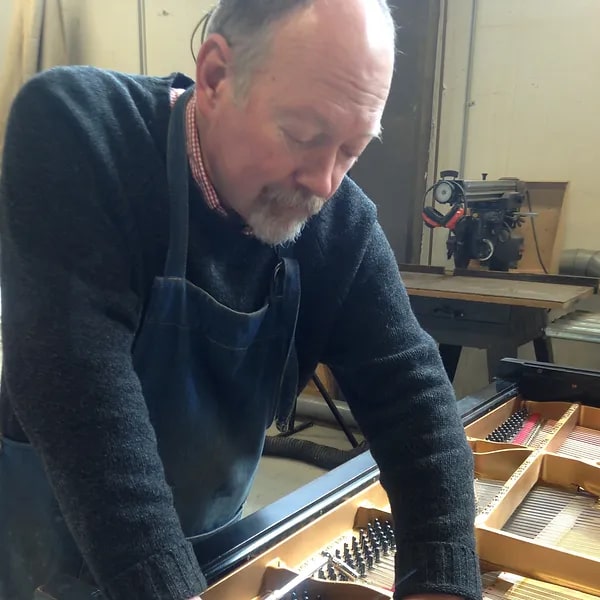
After attending Cornell University in the early 1970s, Ken Walkup studied piano technology at the North Bennet Street School in Boston with teachers Bill Garlick and David Betts. Returning to Ithaca in July 1975, he started a private piano tuning and repair practice and began servicing pianos for the Cornell University Department of Music in November of that year. During a career spanning over forty years, he has acquired broad and deep experience in almost all areas of piano work, including concert tuning of both modern and early pianos, piano rebuilding, in-home piano service, and sales of rebuilt pianos.
Anne Acker
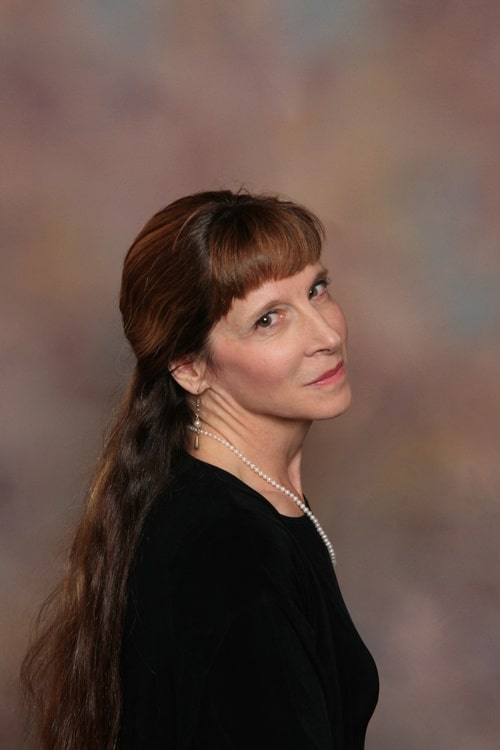
Anne Acker is a full-time historic keyboard specialist, despite having accumulated various degrees in mathematics and computer science once upon a time. Much more happily, she builds, restores and decorates harpsichords, clavichords and historic pianos for clients internationally as well as acting as an appraiser, researcher, consultant, lecturer and writer. She served as a Senior Editor and Contributor for Oxford University Press’s 2nd edition of the Grove Dictionary of Musical Instruments, responsible for stringed keyboard instrument related entries, electronics, computers, “weird cool stuff,” and touch. She plays various keyboard instruments professionally including with her own group, Savannah Baroque, as harpsichord and general continuo for the Savannah Philharmonic and the Hilton Head Symphony Orchestra, has soloed with a number of orchestras, and plays with the medieval and Renaissance music group The Goliards on portative organ, percussion and sinfonye. She has workshops/homes in Savannah, Georgia and the mountains of Pennsylvania (where she has appropriately taken up the mountain dulcimer), both of which are well occupied with members of her keyboard collection.
Xak Bjerken
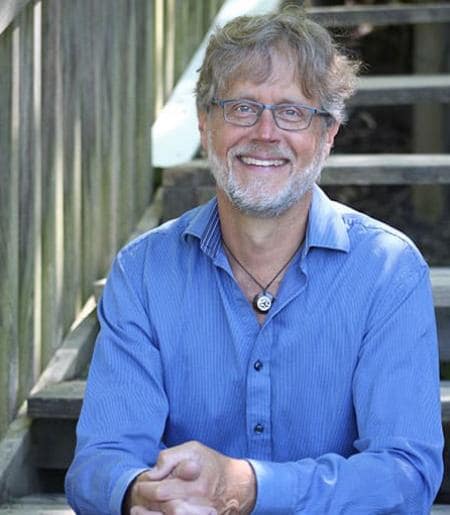
Pianist Xak Bjerken has appeared with the Scottish Chamber Orchestra, Spoleto Festival Orchestra, Thailand Philharmonic Orchestra, the Schoenberg Ensemble, and the Los Angeles Philharmonic in Disney Hall. He has performed at the Concertgebouw in Amsterdam, Glinka Hall in St Petersburg, the Konzerthaus in Berlin, and for many years performed throughout the US as a member of the Los Angeles Piano Quartet. He has held chamber music residencies at the Tanglewood Music Center, Spoleto Festival, and Olympic Music Festival. He is the director of Ensemble X, a new music ensemble, and has served on the faculty of Kneisel Hall, the Eastern Music Festival, and at the Chamber Music Conference at Bennington College. Bjerken has worked closely with composers Győrgy Kurtag, Sofia Gubaidulina, Steven Stucky, and George Benjamin, and has premiered piano concertos by Stephen Hartke, Elizabeth Ogonek, and Jesse Jones, a recording of which was released by Naxos in September, 2021. He released his first solo recording on CRI in 2001, and has since recorded for Koch International, Chandos, Albany Records, Artona, and has recently released his third recording for Open G Records, presenting solo and chamber works by Steven Stucky. Xak Bjerken is Professor of Music at Cornell University where he co-directs Mayfest, an international chamber music festival with his wife, pianist Miri Yampolsky. He studied with Aube Tzerko at the University of California at Los Angeles and received his Master’s and Doctoral degrees from the Peabody Conservatory as a student of and teaching assistant to Leon Fleisher.
Sezi Seskir
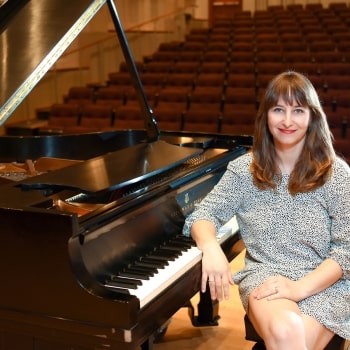
Sezi Seskir has performed many solo and chamber music recitals in Europe, the USA, and Turkey, as well as with various orchestras as a soloist. Her experience performing on a variety of historical keyboards, including 5-octave instruments from the second half of the 18th century, as well as 6 and 6.5-octave instruments from the first half of the 19th century, enriched and deepened her understanding of the genres and repertoire of these periods. She has given several guest lecture-recitals and workshops at schools such as UC Berkeley, Stanford University, Princeton University, the Royal Conservatory of the Hague, Trinity College of London, and Penn State University. She presented her work on Schumann at the American Musicological Society’s (AMS) 2012 meeting, at the Schumann-Haus in Zwickau, Germany, and the Basel Musikhochschule in Switzerland. These last two presentations resulted in two articles, both of which appeared by Studio Punkt Verlag, in Germany and in Basel, Switzerland, respectively. Seskir recently edited Robert Schumann’s piano works Arabeske, Op. 18 and Blumenstück, Op. 19 for the Schumann Complete Edition and Bärenreiter publishing houses. Her CD of three Beethoven violin sonatas with Lucy Russell recorded on period instruments appeared in 2020 by the Acis label, which was received enthusiastically by reviewers. She is a co-founder of the Chamber Music Collective, an intensive chamber music program that takes place at the UC Berkeley and Bucknell University campuses. Seskir received her first degree in piano in her native Ankara, Turkey. She went on with her studies in Lübeck Musikhochschule and then completed a D.M.A. degree with Malcolm Bilson at Cornell University. She is currently an Associate Professor of Music at Bucknell University.
Brian Wang
aBrian Wang is a senior in the College of Arts and Sciences majoring in Biological Sciences. He currently studies piano with Professor Xak Bjerken. Before coming to Cornell, he studied at the Manhattan School of Music Precollege in New York City with Dr. Arkady Aronov. Brian was awarded first place in the Golden Key Debut International Piano Competition and the Princeton Festival Piano Competition, and he has performed in venues including Carnegie Hall’s Stern Auditorium and Vienna’s Palais Ehrbar. At Cornell, he was the winner of the 2022 Concerto Competition, performing with the Cornell Symphony Orchestra. He has also been featured as a chamber musician in the Young Person’s Concert of Lincoln Center’s Chamber Music Society. He continues to be an avid chamber musician, participating in various ensembles while at Cornell. Brian is also the president of Cornell Piano Society, a student organization that organizes affordable peer-to-peer piano lessons for Cornell community members. When he is home in New York City, he volunteers with Calvary Hospital, bringing music to hospice patients.
Miri Yampolsky
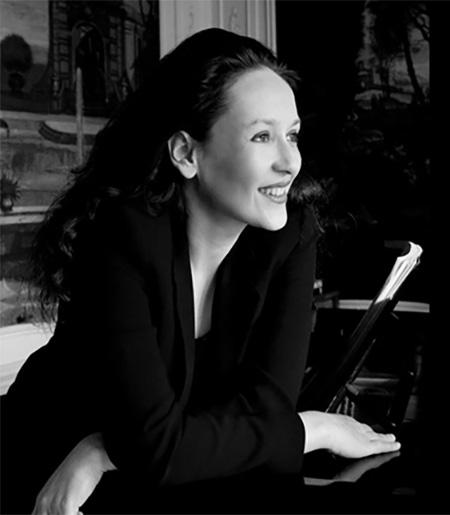
Pianist Miri Yampolsky was born in Moscow and raised in Israel, where she studied with Hannah Shalgi and Michael Boguslavsky at the Tel Aviv Academy. At age 16, she was a soloist with the Israel Philharmonic Orchestra under Zubin Mehta, and in subsequent years has performed with the Jerusalem Symphony, the Mainz Symphony, Chicago Chamber Orchestra, the National Orchestra of Johannesburg, and the Xalapa Symphony in Mexico. Miri studied in Madrid with Dmitri Bashkirov at the Escuela Superiór De Musica Reina Sofia, and later with Leon Fleisher at the Peabody Conservatory of Music. A recipient of the AICF awards and a top prize-winner of the Iturbi International Piano Competition in Spain and the ARD Competition in Munich, Miri has been a Fellow at the Tanglewood Music Center, and performed at Ravinia, Olympic, Tucson, and the Peninsula Music Festivals in the US, as well as the Jerusalem International Chamber Music Festival, the Upper Galilee Music Festival in Israel, Hitzacker, Schwetzingen, and Berlin Festwoche in Germany. Miri is Senior Lecturer at Cornell University, where she has taught chamber music and piano since 2005, and together with her husband Xak Bjerken, she co-directs Mayfest, Cornell’s international chamber music festival, where she has collaborated with the Casals, Formosa, and Chiaroscuro String Quartets, as well as distinguished artists Mikhail Kopelman, Steve Doane, Cynthia Phelps, Philippe Graffin, Tatiana Samouil, and Zvi Plesser, amongst others. Ms. Yampolsky’s recordings can be found on Naxos, MDG, and Open G Records. She is the proud mother of Misha, Anna, and Maya.
Morton Wan
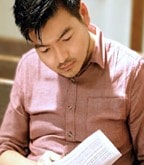
Morton Wan is a PhD student in musicology at Cornell University. His research broadly concerns the entwinement of music and political economy in history. He is currently finishing his dissertation, which is intended as a musical history of the South Sea Bubble of 1720—the world’s first modern financial crisis. Morton holds a BA in economics and philosophy and an MPhil in musicology from the University of Hong Kong. He also earned an MSt in music with distinction from Oxford University. His research work has been supported by fellowships and grants including from the Beinecke Library at Yale University, the Center for 17th- and 18th-Century Studies at UCLA, and the Institute for European Studies at Cornell University. Morton is an active pianist and harpsichordist, having received his training at the Royal Academy of Music in London and McGill University in Montreal.
Alexander Meszler
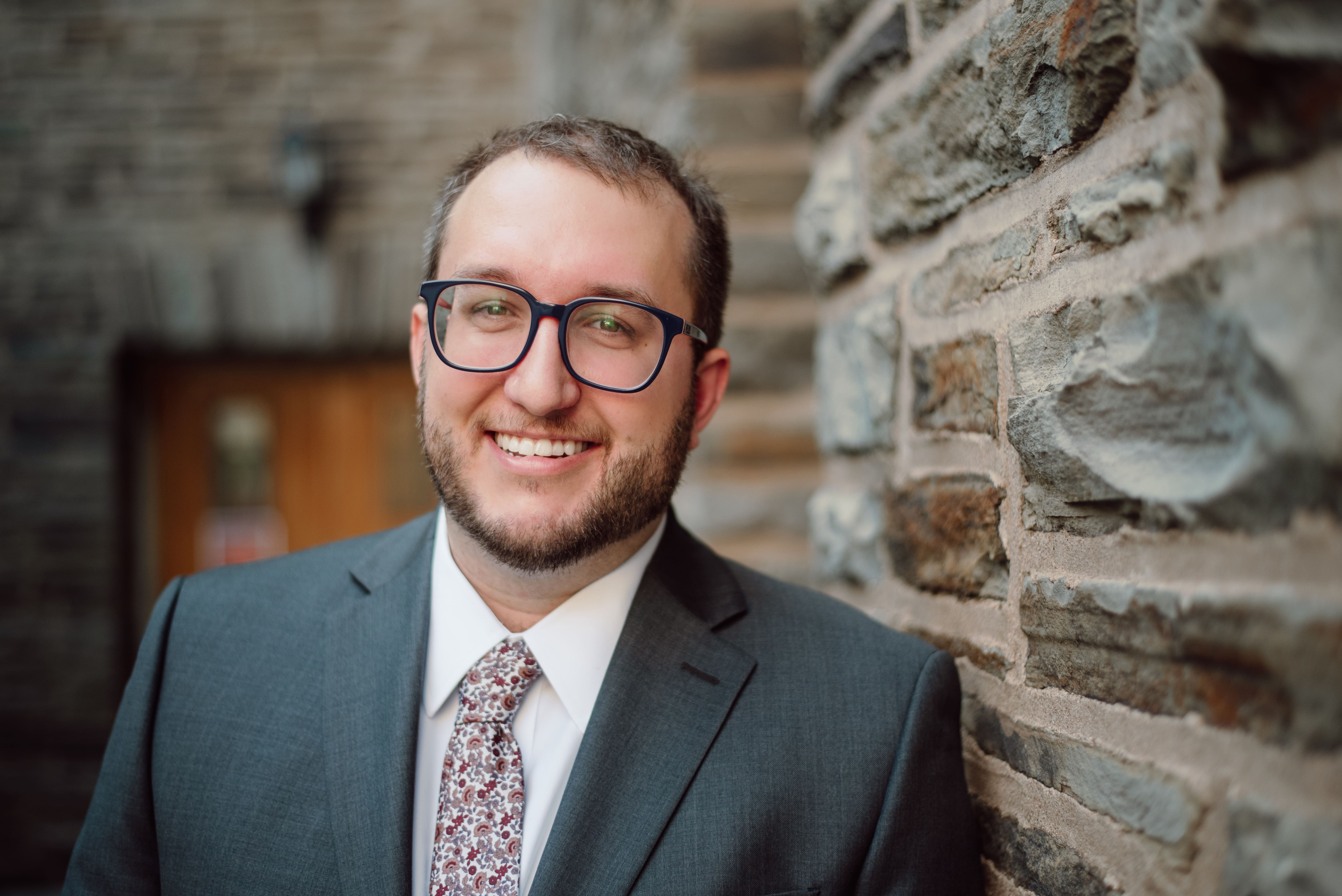
Alexander Meszler is dedicated to interdisciplinary research, investigating intersections between the organ and the social sciences. As a Fulbright recipient, Alexander spent a year in Versailles, France to research secularism and the organ and to study with Jean-Baptiste Robin at the Conservatoire à Rayonnement Régional de Versailles. This research contributed to his doctoral document, “The Organ in a Secular Age: Secularization and the Organ in the United States.” In 2018, he was awarded a grant from the Ruth and Clarence Mader Memorial Scholarship Fund for his ongoing project, “The Organ and Secularized Churches: Church Brewpubs of the Rust Belt Region.” In 2017, he was awarded a substantial grant from the Arizona Center for Renaissance and Medieval Studies for a project investigating secularism and the organ throughout western Europe during the Renaissance. His research probes areas as diverse as the cultural role of the organ throughout the Asia Pacific, as emerging composers, and the published keyboard works of the sixteenth-century Andrea Antico. The latter was awarded the Diapason’s inaugural Gruenstein Award in 2020. With Kimberly Marshall, he is the editor of a forthcoming online Encyclopedia of the Organ which will contain more than 4,000 articles about the organ. Meszler currently serves as Assistant Professor of Organ and College Organist at Luther College in Decorah, Iowa. https://www.alexandermeszler.com/.
Randall Harlow
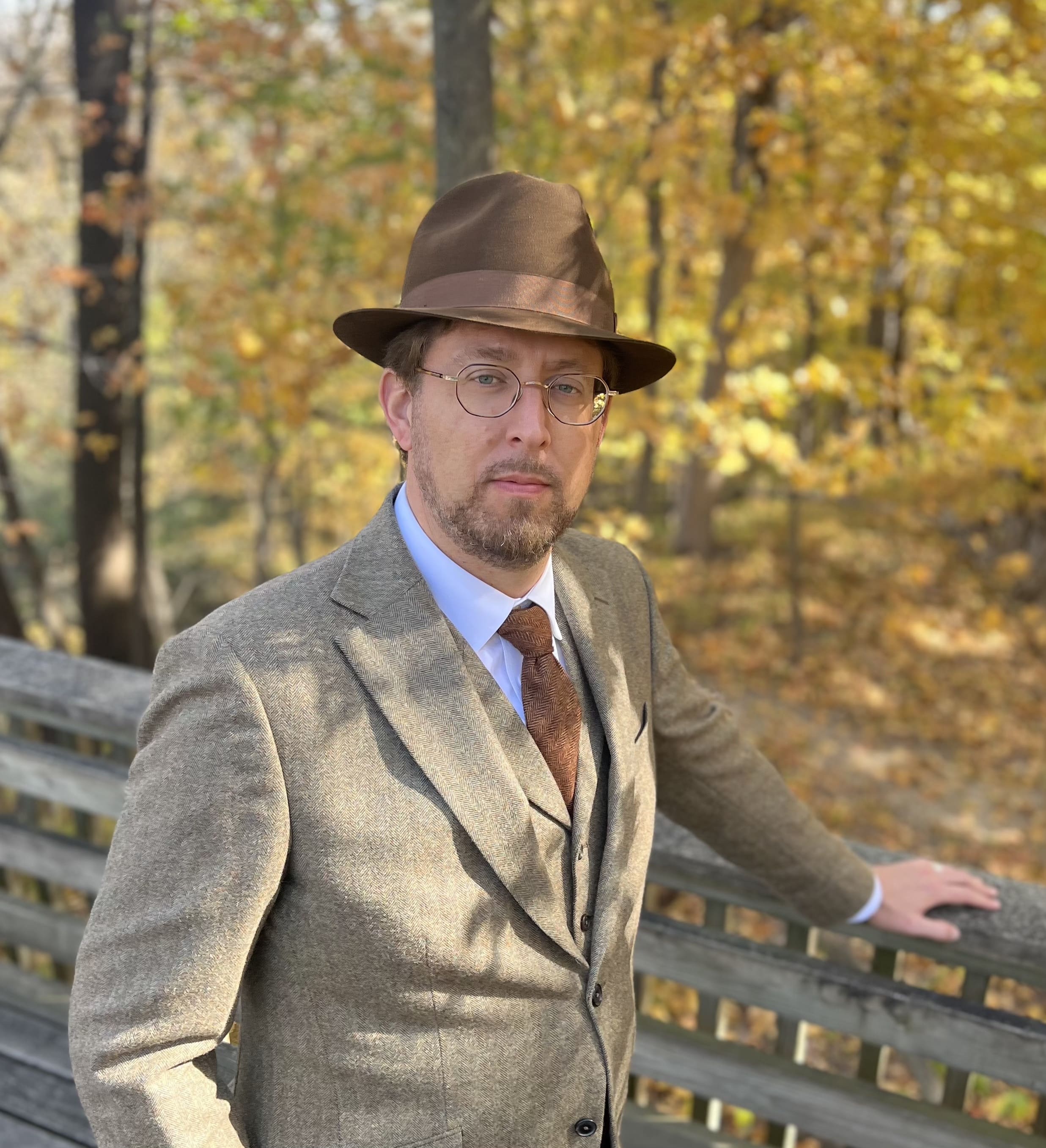
Randall Harlow is a performer-scholar whose research focuses on the embodied ecology of musicking. Weaving together interdisciplinary threads from 4E cognition, semiotics, STS, and performance and critical studies, his work theorizes deep gesture as the catalyst for the dynamic networking of cognitive and social dimensions of music performance, listening and discourse. His research has been published in the journals MUSICultures and Keyboard Perspectives, and he has presented at numerous international conferences, including AMS-SEM-SMT, ICMPC, NIME, GOArt, EROI, Performance Studies Network, musicological conferences at Harvard and Oxford universities, and is a frequent keynote speaker at the annual Orgelpark International Symposium in Amsterdam. He was recently awarded a Fulbright Global Scholar fellowship with residencies at McGill University (CIRMMT) and the Orgelpark to launch the Global Hyperorgan project, a platform for collaborative, intercontinental acoustic musicking. As a performing artist, his concerts and albums seek to upend prevailing conceptions of pipe organ performativity. This summer he released two albums, dreams of dharma and Sonata quasi Coltrane, the first two parts of a planned triptych of radically-unconventional organ albums inspired by the American beat writers of the 1950s. Randall Harlow is Associate Professor of Organ and Music Theory at the University of Northern Iowa and holds the Doctor of Musical Arts degree from the Eastman School of Music.
Nathan Laube
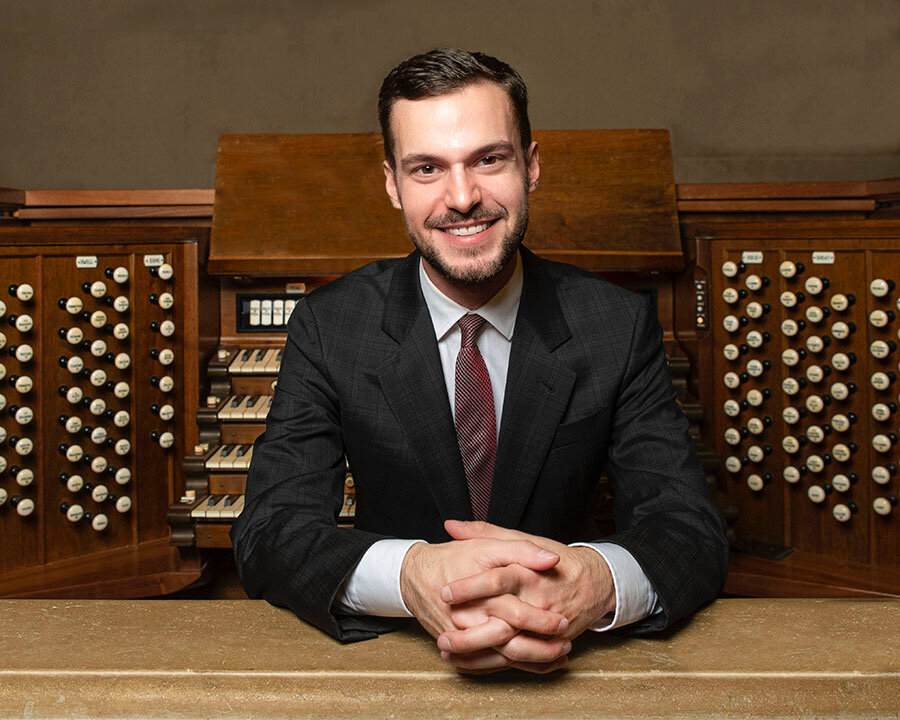
Nathan Laube’s extensive recital career includes major venues spanning four continents, with notable appearances at the Vienna Konzerthaus, the Hamburg Elbphilharmonie, the Berlin Philharmonie, the Sejong Center (Seoul), Royal Festival Hall (London), Maison Radio France (Paris), Auditorium Maurice Ravel (Lyon), Zaryadye Concert Hall (Moscow), Walt Disney Concert Hall (Los Angeles), Verizon Hall (Philadelphia), Maison Symphonique (Montréal), Notre-Dame Cathedral (Paris), and St. Paul’s Cathedral (London), the Frauenkirche (Dresden), and the Berlin Dom. For the summer 2017 he was chosen as the first Organist in Residence at the celebrated 1738 Müller Organ of the St.-Bavokerk in Haarlem (Netherlands). In August 2022 he made his debut for the prestigious BBC Proms in a live-broadcast solo recital at Royal Albert Hall in London. Recent highlights have included recitals at Budapest’s Béla Bartok National Concert Hall (Müpa) and at Barcelona’s Palau de la Música Catalana.
He is regularly called upon to inaugurate important new organs, including those of St. Stephen’s Cathedral (Vienna), King’s College Chapel (Cambridge, UK), Canterbury Cathedral (UK), York Minster (UK), the Gothenburg Concert Hall (Gothenburg, SE), among others. In the USA, they have included the monumental C.B. Fisk organ at The Holy Name of Jesus Cathedral in Raleigh, NC, and the Noack organ at St. Paul’s Cathedral in Birmingham, AL, as well as the restored Aeolian-Skinner at Northrop Auditorium at University of Minnesota. In 2023 he inaugurates the largest organ in the Czech Republic at St. Moritz in Olomouc, and in 2024 he will take part in the inauguration of the Rieger organs in the Concert Hall in Helsinki (FI) and at the Cathedral in Graz (AT).
Passionate about organ design and aesthetics, he also serves as a consultant or takes part in reference groups for new instruments, including the new Rieger organ for the Concert Hall in Göteborg, Sweden, the Dobson Organ at the Curtis Institute of Music in Philadelphia, among many others.
In April 2019, Mr. Laube launched the documentary-style radio program, “All the Stops,” on the WFMT Radio Network Chicago. His recording of the Stephen Paulus Grand Concerto with the Nashville Symphony and Giancarlo Guerrero, received a GRAMMY Award for Best Classical Compendium. Mr. Laube is currently professor of organ at the Eastman School of Rochester, New York, where he taught from 2013 to 2020. From 2020 to 2022, Mr. Laube served as organ professor at the Musikhochschule in Stuttgart, Germany, and since 2018 Laube serves as the International Consultant in Organ Studies at the Royal Birmingham Conservatoire.
